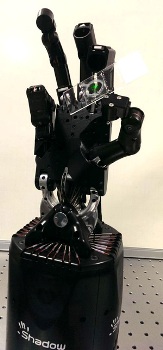Mar 27 2014
NPL has started a new strategic research partnership with UCL and MIT focused on haptic-enabled sensing and micromanipulation of biological self-assembly - BioTouch.
 A computer operated dexterous robotic hand holding a microscope slide with a fluorescent human cell (not to scale) embedded into a synthetic extracellular matrix
A computer operated dexterous robotic hand holding a microscope slide with a fluorescent human cell (not to scale) embedded into a synthetic extracellular matrix
The project will probe sensing and application of force and related vectors specific to biological self-assembly as a means of synthetic biology and nanoscale construction. The overarching objective is to enable the re-programming of self-assembled patterns and objects by directed micro-to-nano manipulation with compliant robotic haptic control.
This joint venture, funded by the European Research Council, EPSRC and NPL's Strategic Research Programme, is a rare blend of interdisciplinary research bringing together expertise in robotics, haptics and machine vision with synthetic and cell biology, protein design, and super- and high-resolution microscopy. The research builds on the NPL's pioneering developments in bioengineering and imaging and world-leading haptics technologies from UCL and MIT.
Haptics is an emerging enabling tool for sensing and manipulation through touch, which holds particular promise for the development of autonomous robots that need to perform human-like functions in unstructured environments. However, the path to all such applications is hampered by the lack of a compliant interface between a predictably assembled biological system and a human user. This research will enable human directed micro-manipulation of experimental biological systems using cutting-edge robotic systems and haptic feedback.
Recently the UK government has announced 'eight great technologies' in which Britain is to become a world leader. Robotics, synthetic biology, regenerative medicine and advanced materials are four of these technologies for which this project serves as a merging point providing thus an excellent example of how multidisciplinary collaborative